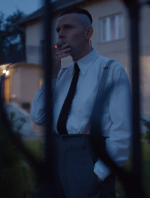Warning: Undefined array key "titleWrapper" in /home/u364374973/domains/theamericanvibe.com/public_html/wp-content/plugins/seo-by-rank-math/includes/modules/schema/blocks/toc/class-block-toc.php on line 103
“The Zone of Interest,” a 2023 historical drama, is not your typical Holocaust film. While it confronts the horrors of Auschwitz, it does so through a chillingly unconventional lens – the eyes of the perpetrators themselves. Written and directed by Jonathan Glazer, the film is a haunting exploration of the banality of evil, raising unsettling questions about the psychology of those who orchestrated genocide.
Table of Contents
10 Facts About “The Zone of Interest” – Unveiling the Monstrosity
1. A Daring Adaptation: From Novel to Screen
“The Zone of Interest” (2023) is a chilling cinematic adaptation of Martin Amis’s acclaimed 2014 novel of the same name. Director Jonathan Glazer takes a unique approach, not by directly depicting the horrors within Auschwitz, but by focusing on the unsettling normalcy surrounding the camp.
2. A Perpetrator’s Perspective: Detachment in the Face of Evil
The narrative unfolds through the eyes of two SS officers stationed near Auschwitz: the ambitious officer Major Viktor (played by Franz Rogowski) and the art aficionado, Paul Doll (played by Godehardt Lassu). Their personal lives and pursuits of pleasure exist in stark contrast to the atrocities happening just beyond their comfortable zone.
3. The Banality of Evil: A Haunting Portrayal
Glazer masterfully captures the unsettling indifference of the perpetrators. We witness the officers discussing art exhibitions, romantic entanglements, and their careers, all while the sounds of death and suffering faintly drift from the camp. This chilling juxtaposition forces viewers to confront the banality of evil.
4. A Jewish Woman’s Untold Story
The film introduces a fictional character, Hanna (played by Sandra Hüller), a Jewish woman forced to work as a translator for the SS. Her presence weaves a thread of humanity and vulnerability into the narrative, offering a glimpse into the lives of the victims.
5. A World Beyond the Fence: Exploring the Periphery
By keeping the horrors of Auschwitz visually out of frame, Glazer compels viewers to imagine the unimaginable. The focus on the “Zone of Interest” – the seemingly idyllic area surrounding the camp – creates a potent sense of unease and highlights the deliberate normalization of atrocity.
6. Critical Acclaim and Award Recognition
“The Zone of Interest” garnered critical acclaim for its bold narrative approach and masterful direction. It received nominations for five Academy Awards, including Best International Feature Film, a testament to its impact and artistic merit.
7. Audience Reception: A Film That Provokes
The film’s unconventional storytelling has divided audiences. Some praise its innovative approach, while others find the lack of explicit depictions of the Holocaust emotionally distancing. The film undoubtedly provokes thought and discussion about the complexities of portraying this horrific period in history.
8. Directorial Choices: A Deliberate Aesthetic
Glazer’s minimalist approach extends to the film’s visual style. Long, static shots and a muted color palette create a sense of detachment and emphasize the stark contrast between the world of the perpetrators and the reality of the camp.
9. Historical Accuracy and Fictional Liberties
While the film uses the setting of Auschwitz and draws inspiration from real-life events, the characters of Viktor, Paul, and Hanna are fictional. This allows for the exploration of broader themes of evil, indifference, and the human capacity for both cruelty and compassion.
10. A Legacy of Unflinching Examination
“The Zone of Interest” stands as a unique and challenging cinematic exploration of the Holocaust. It compels viewers to confront the uncomfortable realities of human nature and the dangers of normalization in the face of atrocity.

The Zone of Interest Box Office and Performance: A Critical Darling
“The Zone of Interest” garnered critical acclaim for its bold narrative approach and masterful direction. It received nominations for five Academy Awards, including Best International Feature Film, a testament to its artistic merit and impact. However, the film’s unconventional storytelling may have limited its box office performance.
Fan Theories and Speculation: Unanswered Questions
The film’s ambiguous ending and minimalist approach leave room for interpretation and speculation. Viewers might consider:
- The Motives of the SS Officers: Why do Viktor and Paul engage in discussions of art and philosophy amidst the camp’s horrors? Are they attempts at self-justification or a desperate clinging to normalcy?
- The Fate of Hanna: The film offers no explicit closure regarding Hanna’s fate. Does she survive the war? This ambiguity prompts viewers to contemplate the countless stories lost to history.

The Zone of Interest Behind-the-Scenes Insights: Bringing a Difficult Story to Life
In-depth interviews with director Jonathan Glazer and the cast would shed light on their motivations and challenges in portraying this sensitive subject matter.
- Directorial Choices: Glazer’s reasoning behind the minimalist aesthetic and focus on the “Zone of Interest” would provide valuable insights into his vision for the film.
- Character Development: Understanding the actors’ approaches to portraying complex characters like Viktor, Paul, and Hanna would offer a deeper appreciation for their performances.
Audience Reactions and Reviews: A Divided Response
“The Zone of Interest” has elicited a range of audience reactions.
- Positive Reception: Those who appreciate the film’s unique perspective commend its ability to provoke thought and discussion about the Holocaust. They value the film’s subtle yet impactful portrayal of the “banality of evil.”
- Negative Reception: Some viewers may find the film’s lack of explicit depictions emotionally distancing and argue that it downplays the severity of the Holocaust’s atrocities.
Also Read
- Eva Longoria On Why Courting “The Most Diverse Generation Ever” Is So Important To Her
- Senate Inquiry Finds BMW Imported Cars Tied to Forced Labor in China
- What We Lose When ChatGPT Sounds Like Scarlett Johansson
- Ford Boss Admits the Mustang Must Lose Weight
- $9 billion travel tech firm Navan on track to hit profitability this year and ‘not far’ from IPO, CEO says
Popular Category
Trending Stories